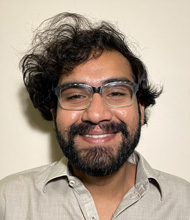
Candidate, Comparative Humanities
Education
- Ph.D. Stanford University, Department of Anthropology, (Ongoing)
- M.A. Medical Anthropology, Stanford University, Department of Anthropology (2022)
- M.A. Honors International Studies, University of Washington, Jackson School of International Studies (2020)
- B.A. History, Political Sciences (minor) Lahore University of Management Sciences (2017)
Courses
- Anthropocene; An Introduction to Environmental Anthropology
Teaching Experience
- Anthro 1; Introduction to Cultural Anthropology – Stanford University
- Medical Anthropology – Stanford University
- Jurisprudence; Social Science Addendum – LUMS
- History department TA – LUMS
- History/ Government and Politics – Lahore College of Arts and Sciences
Biography
Syed Ali Mehdi Zaidi, who goes by Mehdi, is a Ph.D. candidate in the Department of Anthropology at Stanford University with a focus on medical and environmental anthropology. His PhD project, funded by the Wenner-Gren foundation focuses on the social life of heat in the time of ecological crisis. An inability to escape heat marks out sweating and tired bodies as dirty, unkempt, unprofessional. Heat makes public life difficult and divides the city into air conditioned and non-air conditioned zones. The same happens within households where heat mediates the gendering of households pushing women, children, and the powerless into hot zones like the kitchen while the powerful occupy colder, often air conditioned areas. Though the city as a whole heats up more than its surrounding areas, not all parts of the city heat up at the same rate. Thermal inequality often recreates inequalities of class, ethnicity, gender and caste literally heating up the marginalized. His project seeks to understand heat not as an issue of weather but of socio-political and historical processes.
During his Master’s funded by the Fulbright foundation, Mehdi studied drug treatment practices within Quetta outlining how the practice of tuning, coming to seek treatment for drug addiction only as long as it takes to heal the body enough to be able to consume more drugs, has to be read as a practice of care within the larger socio-political of Balochistan. During his undergraduate thesis, he studied anxieties of space and time within a formerly nomadic community within Cholistan which leads to an affective relationship with the desert long after nomadism has ended as a result of environmental and socio-historical factors.








